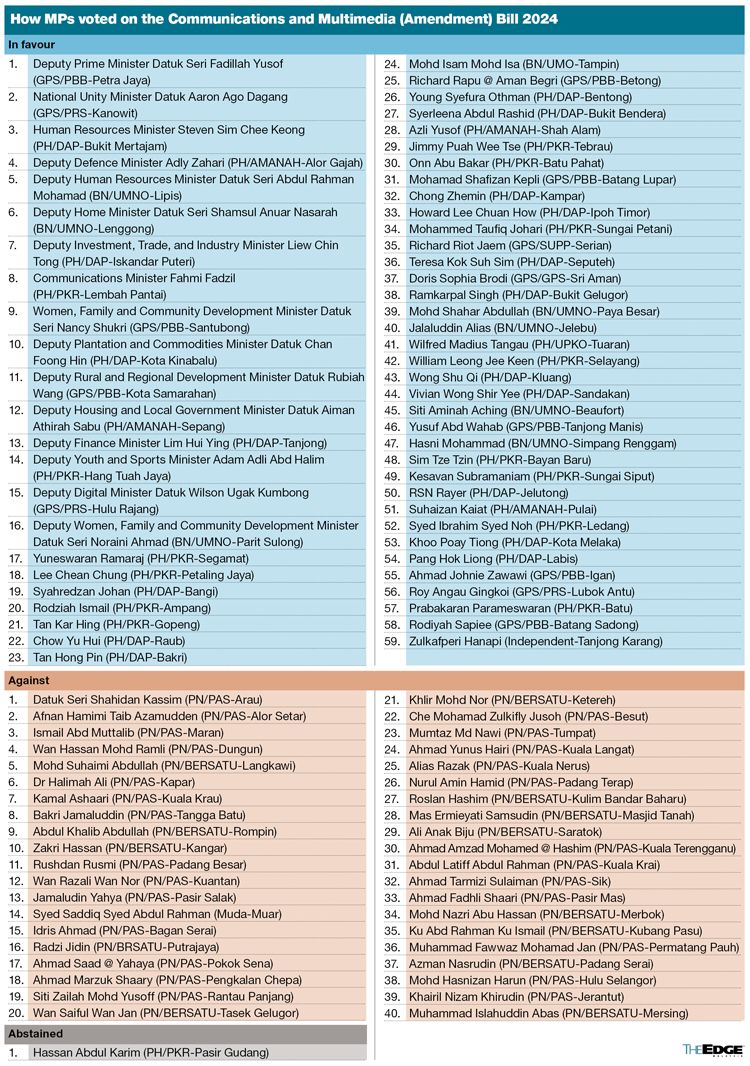
KUALA LUMPUR (Dec 11): The Communications and Multimedia (Amendment) Bill 2024, a topic of significant debate, was passed by the lower house of Parliament on Monday.
The Bill was passed with a slim majority of 19 votes after the opposition requested a bloc vote, resulting in 59 Members of Parliament in favour, 40 against, and one abstention. The remaining MPs — 122 of them — did not turn up to vote.
The Hansard released on Tuesday revealed that three government backbenchers urged for the vote to be postponed and reviewed by a parliamentary special select committee during the four-hour debate.
These MPs were William Leong (Selayang), Ramkarpal Singh (Bukit Gelugor), and Lim Lip Eng (Kepong), all from Pakatan Harapan.
Despite their initial concerns, Leong and Ramkarpal ultimately voted in favour, while Lim was absent.
Notably, Hassan Abdul Karim (PH/PKR-Pasir Gudang) was the only MP to abstain.
Prime Minister Datuk Seri Anwar Ibrahim, Deputy Prime Minister Datuk Seri Dr Ahmad Zahid Hamidi, Transport Minister Anthony Loke Siew Fook, and Opposition leaders Datuk Seri Hamzah Zainudin and Tan Sri Muhyiddin Yassin were also absent during the vote.(See the full list in table)
Civil society groups have been opposing the amendments due to concerns they could violate rights to freedom of expression and privacy.
Some of the specific concerns raised include how it grants the Malaysian Communication and Multimedia Commission (MCMC) and the communications minister powers without oversight, enabling them to control and allow censorship, and how the wording of some provisions is vague and open to interpretation, which could lead to excessive censorship and abuse of power.
The amendments also include higher fines and longer prison sentences for certain offences, raising questions about fairness and proportionality.
Lawyers for Liberty had also slammed the government for going back on its promise to repeal Section 233(1)(a) of the Communications and Multimedia Act — which criminalises the use of network facilities or network services by a person to transmit communication that is deemed to be offensive and could cause annoyance to another.
Instead, it had strengthened it by including "confusing" and "incomplete" in the definition of falsehood that widens the scope of the law. "It will put fear upon the public and prevent them from participating in discussions regarding matters of public interest. It would have a chilling effect on freedom of speech," said its director Zaid Malek in a statement on Dec 4.
"It would mean that allegations of corruption, abuse of power or general criticisms of the government cannot take place unless the public have the complete and full facts of every aspect of any matter or allegation," he said.
For more Parliament stories, click here.
Read also:
Dewan Rakyat approves Communications and Multimedia (Amendment) Bill 2024 in bloc vote
New amendments to Communications and Multimedia Act a backdoor attempt to legislate fake news law, utter betrayal of promise to repeal — Lawyers for Liberty
Govt urged to delay amendments to Communications and Multimedia Act, hold public consultations first
- China amplifies rebuke of Li Ka-shing’s Panama Port deal with BlackRock
- Batik Air throws support behind Subang Airport's expansion, urges faster slot allocation following AirAsia’s departure
- Malaysian stocks turn positive as investors across Asia cheer potential bipartisan deal to avert US govt shutdown
- Gold counters on Bursa Malaysia surge as safe haven demand rises amid concerns over US economy
- Donald Trump makes Chinese stocks great again
- Citigroup sued by more ex-sales traders over 2019 HK firing
- Indonesia to allow new offset sales to bolster carbon trading
- Oracle said to weigh data centre on Indonesia’s Batam Island
- MTT Shipping is said to revive US$200m Malaysian IPO plan — Bloomberg
- Khazanah said to be in talks to buy INCJ stake in tower firm Edotco — Bloomberg

